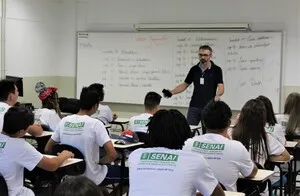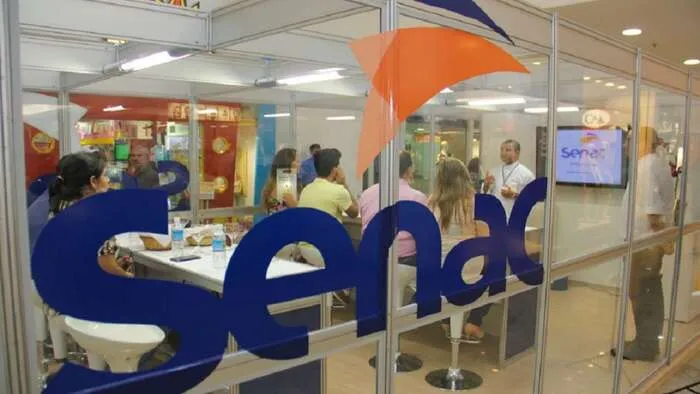Adverts
In Brazil, the free professional education opportunities offered by SENAC and SENAI represent an important pillar in the development of skills and preparation for the job market.
With a wide range of courses in different areas, these institutions are recognized for their commitment to the quality and accessibility of education. Essential for socioeconomic progress, they offer not just education, but a real chance of social advancement.
Adverts
By democratizing access to quality professional education, SENAC and SENAI play a crucial role in training qualified professionals ready to meet the demands of an increasingly demanding job market.
Furthermore, they contribute significantly to reducing unemployment and increasing national competitiveness through the training of specialized labor adapted to the country's industrial and commercial needs.
Adverts
Diversity and Flexibility of Courses at SENAC and SENAI
Both institutions, SENAC and SENAI, offer courses that cover a variety of professional areas, from information technology, occupational safety, to management and commerce. The courses are designed to cater to beginners and professionals looking to specialize or improve their skills.
Furthermore, SENAC stands out in courses in the area of hospitality and beauty, while SENAI focuses on industrial areas such as automation and mechatronics. Programs are adapted to reflect current market trends, ensuring students acquire skills that set them apart.
Adverts
Often, these courses include innovation and entrepreneurship modules, preparing students not only to be employed, but also to create their own businesses. This holistic approach to career development is a huge draw, further increasing the value of these trainings in today’s educational and professional landscape.
Infrastructure and Learning Resources
A big advantage of studying at SENAC or SENAI is the modern infrastructure and cutting-edge learning resources. These institutions are equipped with up-to-date laboratories and equipment that simulate real professional environments, providing invaluable hands-on experience to students.
Adverts
Additionally, both institutes offer access to specialized software and digital platforms that complement practical learning with interactive theoretical resources.
This allows students to not only apply their knowledge in real-world situations, but also adapt to emerging technologies and updated industrial procedures. The learning environment is designed to reflect real working conditions, which effectively prepares students for the demands of today's job market.
This holistic approach ensures that SENAC and SENAI graduates are ready to enter the job market not only with knowledge, but with the ability to innovate and adapt to changes.
Connection with the Labor Market
The free courses offered by SENAC and SENAI go beyond technical training, establishing a direct bridge with the job market. These institutions often collaborate with companies across industries to develop programs that meet the specific needs of today's business environment.
This results in an education that prepares students not just with theory but with practical skills valued by employers.
Additionally, SENAC and SENAI regularly hold job fairs and offer internship programs, providing students with a platform to launch their professional careers. These initiatives are essential to place graduates in job positions that correspond to both their aspirations and market demands.
Through these fairs and internships, students have the opportunity to meet potential employers, better understand market dynamics and position themselves competitively in the world of work.
Recognized Certification
Upon completing the SENAC and SENAI courses, students receive certificates that are well recognized in the Brazilian job market. These certificates validate the skills and knowledge acquired, being an important differentiator in the search for better positions in the job market.
This recognition not only opens doors to new employment opportunities, but also serves as tangible proof of the student's competence and dedication. Employers value these certificates because they represent a high standard of training and technical knowledge, reflecting the quality of the training received at the institutions.

Furthermore, many courses are aligned with the regulations and requirements of certain industrial sectors, ensuring that students are ready to meet the specific demands of the areas in which they wish to work.
Access and Registration Process
The registration process for free courses is simple and, in most cases, can be done online. This facilitates access for many people, including those who live in more remote areas or who have time and transportation limitations.
Furthermore, online registration democratizes the educational process, allowing interested parties from any part of the country the opportunity to improve their qualifications without additional travel or accommodation costs.
Application forms are generally straightforward and easy to complete, and the SENAC and SENAI institutions' websites offer step-by-step guides that assist applicants throughout the process.
These courses are designed to be inclusive, with simplified entry requirements to ensure education is accessible to everyone, regardless of their prior financial or academic situation.
Conclusion: SENAC and SENAI
The free courses offered by SENAC and SENAI are more than just educational programs; They are gateways to the job market and tools for social transformation. They represent an incredible opportunity for people of all backgrounds to improve their lives through education.
For those looking to enhance their skills or explore new careers, these courses offer a valuable combination of quality, affordability and professional relevance. Furthermore, both institutes promote effective social inclusion, allowing low-income individuals to have access to quality education at no cost.
This initiative not only empowers individuals, but also strengthens communities by reducing inequality through education and creating a virtuous cycle of economic growth and development.
By training people with in-demand skills, the courses also contribute to a more qualified and diverse workforce, essential for the country's economic sustainability.
